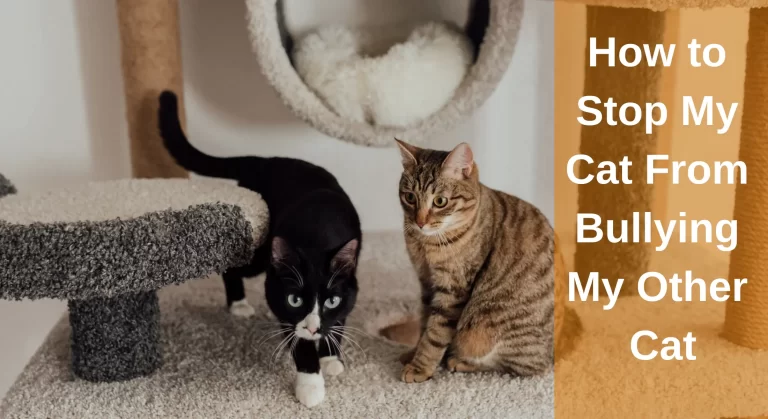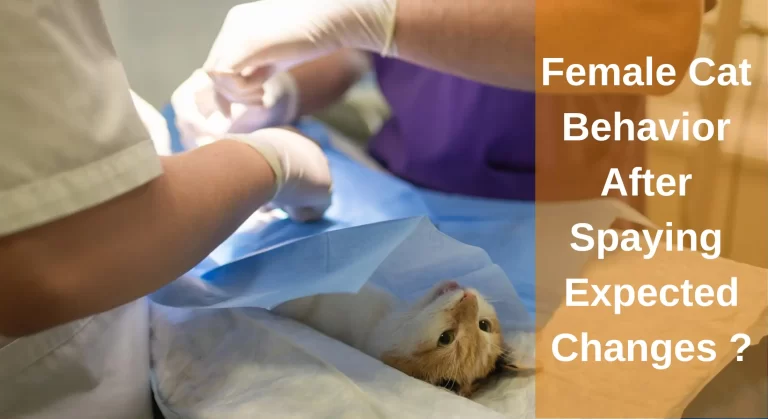How To Introduce A Kitten To An Older Cat? [A Complete Guide]
Are you planning to introduce a charming new kitty to your older, wiser cat? When you have a senior cat, adopting a kitten can be quite a challenge. Many cat species have trouble adjusting to the arrival of a new kitten, especially single adult cats. A new kitten can be a great addition to your home, but there are many things to consider before you take the next step.
Before making any introductions, keep in mind that your cats might be territorial, and they may not welcome a new and unknown cat into their environment right away!
Let your older cat know the kitten’s scent before it comes into your home so their first encounter is not stressful. Create a positive environment, introduce the cats by sight and keep them apart physically so they can get accustomed to each other’s scent. Make the introduction gradual, giving each a chance to get used to the other’s scent.
However, if things don’t go according to plan, your old cat may get depressed, hide, hiss, and even stop eating or even start urinating strangely. Your cat behaves this way because cats don’t like change, especially when it involves their territory. The best way to prevent these behaviours is to prepare before your kitten arrives and make sure the introductions are properly managed. The things you can do to reduce your cat’s anxiousness and make introductions more enjoyable are as follows:

How Long Does It Take for an Older Cat to Accept a Kitten?
Felines are intelligent animals having their own thinking, emotions, and aspirations. Some elderly cats will welcome a kitten practically right away, while others might take many months to adjust.
It shouldn’t be assumed that two felines will become friends within a week. They’ll take almost 3-4 months. The older cat’s temperament and the kitten’s ability to settle down soon are determining factors.
Your elder feline will embrace the kitten’s existence more quickly the more wonderful experiences it has had, and the greater you reassure your cat that he won’t be ignored.
Check Out: Why Do Mother Cats Attack Their Older Kittens?
Tips: How to Introduce A Kitten To An Older Cat
When introducing your kitty to an adult feline, many variables play an important role, including their attributes and how well they engage with other pets. If you want that your adult cat accepts your new kitten, take the following actions to simplify the process for everyone living in the home:

1. Prepare your Home
If you’ve recently bought a new kitty for your home, it’s a good idea to get things ready in advance. During the initial week, give both felines their own territory, including meals, drinks, a litter box, a scratchboard, and a cosy sleeping area.
The elder cat may become less aggressive as a result, and your new kitty will be easily adjusted to his new place. Make your new kittens’ place smaller and less frightening so that they can easily adjust to it.
2. Restrict your New Kitten
Kittens have a curious nature and always want to explore their new house immediately because they are so active, but don’t allow them to do so immediately after their arrival. This won’t only put your new kitty in danger of being injured but will also annoy the older cat. Keep your new kitten in his private room for at least one week with food and water bowls, bedding, a litter tray, and toys.
Your older cat will already mark large portions of your house as her domain. You must keep both cats away until it’s ready to welcome a new kitty in their environment.
Give them at least two weeks if you need to move your current cat’s possessions to make room for the kitten
3. Introduce your Felines via Smell and Sound
Particularly, the fragrance of pheromones is essential while introducing a new kitten to your elder cat. Cats can get accustomed to touching one another by listening to and sniffing each other. Keep both felines apart, but massage them together by using the same cloth to combine their odours.
Additionally, feeding both felines together on different sides of a partition will assist them in learning positive associations with the odour of another cat. Another choice is to switch them into each other’s spaces after keeping them in separate spaces for a few days. This method also aids the kitten in settling into a new household environment.
4. Show a Glimpse of the New kitty to the Older Cat
Your older cat has to understand how to become familiar with the new kitty by sight now. For this purpose, keep your older cat at a secure distance or behind a safety barrier. Now take your new kitten inside your house in a cage.
Your older cat should be allowed to contact, allowing both of them to interact. They must be aware that they reside in the same residence. After a while, make this visual meeting hidden behind walls since the new kitten must be protected from the elder cat because it may start hissing after some time.
If you wish to release the kitten, let both of them stand at different sides of a hallway and watch each other. Always make sure to keep them apart and away from one another.
Open the door and let the cats meet once you’re sure they’re getting along in the cage. Keep a watch on your kitten’s early interactions and be ready to save it if it is in danger. The first stage might last anywhere from days to months.
5. Offer Rewards
You shouldn’t be shocked if your cats take some time to get accustomed to one another. These processes require time! Use rewards and urge them to play when they behave peacefully and appear to enjoy being with one another to promote connection.
At this point, make sure to cuddle and compliment your older cat more frequently. Convince him that you’re just getting a new kitty and not replacing him.
6. Set Up a Date Night
A cat’s tummy is the entrance to its emotional core. As a result, introducing older cats and kittens during date nights is a brilliant idea. Give them food separately, separated by a partition simultaneously.
The most effective approach to accomplish this is by nursing the new kitty in the designated room while putting your older feline in the hallway. Set the cat’s food for the elderly feline on the opposite side of the partition. You may have to convince your cat to feed in this strange place since this is a shift in habit.
Hopefully, the food will be consumed by both felines. But the other feline’s arrival won’t be overlooked. They’ll both begin to link one other with a meal.
7. Plan a Playtime
It is now appropriate to reunite the cats. Under strict monitoring, this must be performed for a brief time. You’re not quite yet prepared to allow your kitten full access to your home.
Put both kitties in a safe area. Violence will result from placing a kitten in an adult cat’s domain. Your older cat shouldn’t be allowed to visit your kitten’s domain. The kitten can lose its sense of security if a battle breaks out.
8. Observe how your Felines Respond
There is no assurance that your felines will attach right away, so always watch your felines once they appear relaxed with one another. Keep an eye out for symptoms of anxiety and depression, such as reduced hunger, prolonged hiding, vocalizing, aggressive behaviour, or other strange behaviours that persist for over a few days.
Older cats may retaliate by napping in odd areas or by altering their regular feeding and drinking habits. Ensure that your feline has easy reach to their litter trays and that their usual exit doors are open.
It’s also crucial to ensure that the elder cat is still normally consuming food and water. Older felines are more susceptible to dehydration, and if a new cat moves into their area, they might stop drinking as frequently as they did previously. It is advisable to talk to your veterinarian if you have any concerns regarding your cat.
9. Make Sure Your Older Cat Doesn’t Bully Your Kitten
Your older cat may take on the role of alpha cat and start bullying the younger ones. Bullying can endure for years, making life difficult for beta cats. Look for the indicators if your cat is bullying your kitten (or new cat):
10. Calm, Patient Environment
Be as calm and patient as possible when your cats are ready to meet face-to-face!
Remember that your existing cat will need to learn to share his or her territory and welcome the new kitten.
Older cats may be less tolerant, so start with short introductions and gradually increase the amount of time they spend together.
11. Follow a plan to Reduce Stress
Cats enjoy routine. You can ease your cat’s adjustment by sticking to a routine for playing, mealtime, and sleeping. As your senior cat got a new friend shouldn’t force her routine to alter. Maintaining the same lifestyle will reduce the anxiety of transition for your existing feline and assist your new kitten in adjusting.
12. Let Your Cat Develop a Hierarchy
Your older cat may try to establish a hierarchy with the new kitten for a while. If the kitten does anything annoying, your larger cat may hiss. This is quite normal, and you should avoid interfering as long as it’s just hissing and swatting.
Your household’s dominant cat is establishing itself, and the kitten is learning where its new cat’s boundaries are.
Also Read: I Got A New Kitten And My Cat Hates Me – What Do I Do?
How to Get Older Cats to Accept New Kittens?
While young felines are joyful for their caretakers, elder cats may find them annoying or a danger. Senior cats sometimes find it difficult to adopt kittens for a variety of reasons, which include:
- Dislike for alteration and routine disturbance
- Apprehension of getting replaced or ignored
- Dislike sharing resources
- Instinctively protecting the house from invaders or spies
- Kitten’s lack of sociability
The latter can cause problems in the interaction between a new kitten and an older feline. Kittens observe their moms and fellow mates for good behaviour. If the kitten is split up too early, it won’t have the necessary social abilities.
At 8 weeks old, the majority of kittens are prepared to be adopted. At this stage, the kitten is independent of its mum. But the crucial period for socialization is still the following month. Even then, you’ll have to make some effort to ensure your adult feline and youngster get along. There are several actions:

1. Separate their Play area and Supplies
The term “share” is unlikely to appear in the vocabulary of cats. Cats still have their forefathers’ feral traits. This entails that they preserve their belongings and seize every opportunity to benefit themselves.
Don’t expect an adult feline to offer its supplies if you desire it to welcome a kitten. Provide your kitty with its couch, litter box, meal, drink bowls, and accessories. Although your kitten might be eager to share your older cat’s materials, they’ll rarely be accepted in return.
Keep both felines’ resources away from one another as much as possible. Start placing the food bowls at the room’s opposing ends. This will stop them from fighting over their meals.
Each cat will require a separate region. Older cats require a tranquil setting where they may observe the universe pass by. Ensure your older cat has had this area and the kitten can’t get it.
2. Maintain the Daily Schedule
A new kitty is a source of great joy. You’ll have to set up the house for the new kitten and keep a close eye on it. Kittens are inquisitive and naughty; if left unsupervised, they might encounter all kinds of problems. It’s crucial that you remember your existing cat, though. Cats hate routine alterations. It’s natural to suffer stress once a new cat enters the house. Maintaining a schedule will prevent your elderly cat from feeling abandoned.
Do everything normally with an older cat. Play with your previous cat. Give him regular meals at planned times and treat them as normal. Cuddle your elder cat while you’re cuddling your new kitty. There is jealousy in cats.
This may require careful balance. Although you should ensure that the demands of the current cat are addressed, kittens want a lot of care and effort. If the older cat thinks the kitten is consuming its time or energy, it may react violently.
3. Promote Hierarchy
A dominant or dependent social order exists in every cat partnership. This is frequently determined by age. Unfortunately, some cats will get arrogant and attempt to dominate an older cat. The kitten needs to be returned to its rightful place in these circumstances.
Your adult cat may shriek or swipe at the new kitten as a result. Cats need to be separated if a real fight starts.
Frequently Asked Questions
Is It Possible for a Senior Cat And a Kitten to Get Along?
Some cats may get along OK in the same house, they don’t necessarily ‘need’ other cats, and some may find it difficult to accept a new kitten.
A few steps are taken ahead of time to prepare for your kitten’s arrival, as well as some carefully managed introductions, which should ensure that your cats get along in the future.
Should I let my cat hiss at the new kitten?
During the introduction time between two felines, little hissing is typical. Don’t condemn your cat for hissing because this makes him perceive you negatively. Let both cats interact when there isn’t any hissing for a few days. But if they hiss more violently, take your new kitten away from the older one because it may get harmed by the older cat.
How do you know if your cat will accept a kitten?
When your older cat starts to share his stuff with your new kitten and doesn’t hiss over the new kitten when you cuddle him, this shows that your old cat has started to accept your new kitty.
How long does a kitten get used to an older cat?
A new kitten isn’t much social and may take a long time to accept an older cat. They require a week or even a month to learn how to engage with other cats.
After introducing the kitten to your older cat, be patient because your new kitty may require a long time, depending on their personality.
Why does my cat hate my new kitten?
Cats are incredibly possessive. Your older cat probably thinks the new kitty will own his territory. The threat of your new kitten becoming an owner of the entire house may be frightening for your older cat. Therefore, your cat may hate the new kitten and don’t accept it immediately.
Is it common for a cat to rule over a kitten?
Cats are known for tumbling, wrestling, and fighting. On the other hand, some cats go too far and become aggressive, dominant, and pushy. A lack of sufficient feline-feline socialization is usually to blame.
Wrap Up!
Bringing new kitties into the house is undeniably stressful for both you and them. Your cat and the new kitten should be able to accept each other and even become friends with a bit of patience and time. A veteran can provide further guidance.
Related Posts:
Who is Isabella?
My name is Isabella, and I am a dedicated and knowledgeable cat enthusiast. With years of experience caring for cats and a deep love for felines, I made a mission to help other cat lovers navigate the challenges of cat ownership.






